Primary navigation

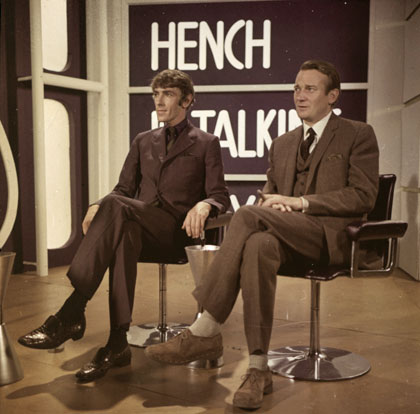
In British film as in pop music, the late 1960s and 1970s marked a watershed of shifting cultures and identities, as Mark Sinker discovers in a selection of the era’s ‘forgotten’ films
Of all the films in the ‘kitchen sink’ school of the early 1960s, only one, Billy Liar (1963), really prefigures the massive thump sideways that British culture – and hence British film – was about to get later in the decade. By collaging Billy’s fantasies, impossible and otherwise, into the sour, self-suffocating, realist shtick so typical of Tony Richardson’s Woodfall films, John Schlesinger’s film hints at why the British New Wave withered so quickly when the Pop Revolution arrived. In its place a new scene briefly flourished that was as diverse as it was hard to summarise, producing British films that, as programmer Niall Fulton puts it, “asked bold questions in a bold way”. Between the New Wave and the arrival of what Fulton identifies (taking 1979’s The Long Good Friday as his marker) as the “Thatcher era” of British cinema, fascinating British films were made that have subsequently been buried beneath memories of the era’s more prominent ongoing franchises, such as Carry On and James Bond – and as a result, they’re almost impossible to see. In putting together his season ‘After the Wave: Lost and Forgotten British Cinema 1967-1979’, Fulton identifies a common sensibility in works as diverse as the Peter Cook vehicle The Rise and Rise of Michael Rimmer, Stephen Frears’ private-eye homage Gumshoe and Horace Ové’s 1975 snapshot of black Notting Hill, Pressure. What these films share, he says, is “the idea of the British national identity being challenged by diversity”.
To those of a certain age, watching a selection of these films back to back opens a floodgate of memory and unexpected affection: for the uncluttered, unreconstructed drabness of city streets and the faces and objects found in them. But it also evokes a different sort of nostalgia – because, as Fulton notes, this was a radical era, in terms of change if not of clarity; a nostalgia for the baroquely tangled and splendid highs and lows of things we once furiously debated, and for the futures that once seemed to lie ahead.
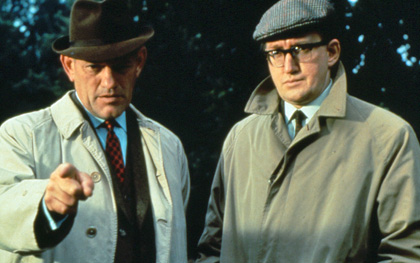
The Jokers
One rediscovery from 1967, the year of Sgt Pepper, is The Jokers, by a director who has since become a national figure of fun – Michael Winner. In summary, it’s a Carnaby Street heist caper: to make fools of the Establishment, two posh brothers steal the Crown Jewels. Much of it is as by-the-numbers as that summary suggests: red buses, Tower Bridge, Beefeaters, dolly-bird debs frugging to chart pop. But there’s a strange edge to it, as if the boredom motivating the protagonists has also somehow curdled the film-makers. The script is by Dick Clement and Ian La Frenais, often employed by Hollywood in later years but best known for The Likely Lads and their deft ear for class mobility and attendant anxiety. The brothers – Oliver Reed and Michael Crawford – effect the blag by phoning in bomb threats in (bad) Irish accents. It’s all played for inconsequential laughs, and yet at the same time it’s uncanny in its prescience. As a world-weary senior copper says to his bumbling sidekick: “They just did it as a gesture. That’s your ‘contemporary hero’, Catchpole, not your mountaineer or your four-minute miler.” Terrorism as a leisure-class hobby; crime as this week’s pop spectacle; the old order dissolving in the exuberance of the ultra-consumable now. Is the policeman (the redoubtable Harry Andrews) impressed, disgusted or stoical? It’s impossible to say.
More prescient still is Kevin Billington’s The Rise and Rise of Michael Rimmer (1970), with a mesmerisingly dapper and unprincipled Peter Cook at its centre, and John Cleese and Graham Chapman among its co-writers. Cook plays Rimmer, a with-it opinion pollster who manipulates his colleagues, his research and his clients (the main political parties) to achieve ultimate power; the film’s witty conceit works because the perspective we never get to see (until the final moment) is the one inside Rimmer’s head. He can glide past all conventions and shibboleths because he’s unmoored and unreal, a pure mimic; and in this sense, while the film may not be politically realistic, it’s entertainingly prophetic. The parody of Election Night Special is full of jokes (about meaningless early predictions, filler reports from counts in progress, the Swingometer) that we still all make. Indeed its final gag – about overloading the electorate with market research and political choices, to induce a reaction against all this democracy – feels distressingly timely, for all the film’s date-tied decor. Even the sexism (girls grotesquely pawed and ogled throughout) seems less antediluvian than you’d hope.
An intriguing element of Cook’s performance as Rimmer is his slippery accent – half languid upper-class drawl, half déclassé interjection. A similar play of accents and identities is at the heart of what Fulton considers the programme’s true find, and the film he would most like to see reinserted into the canon – Stephen Frears’ Gumshoe (1971), which he describes as “an outright British classic”. As Eddie Ginley, a Liverpool bingo caller and would-be private detective obsessed with Hammett and Chandler, Albert Finney mixes his (shaky) Scouse with (equally shaky) American put-on. In the background, Liverpool aches with sadness and failure and loss – the Merseybeat screaming’s over now, all its successes departed down south and off into global fame. In the forlorn, emptied space round this once-great imperial port sprout the entwined tendrils of heroin-running and anti-apartheid politics, a combination as daft and as poetically revealing as any Sam Spade narrative device.
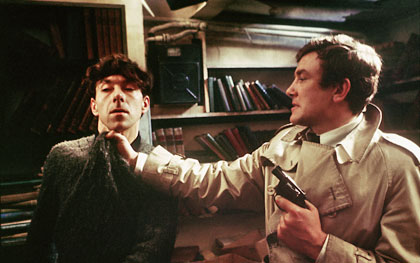
Gumshoe
Though Tom Courtenay was the screen face of Billy Liar, Salford-born Finney had originally shaped the role on stage, and in a sense Gumshoe extends this crafting. Billy Fisher had dreamed of escaping the North to become a TV comedian; Eddie Ginley is a very small-time stand-up whose main comedy off stage is his Marlowesque patter, as he comments sardonically on the scene he’s in. But Eddie’s fantasy is not simply compensatory escapism from this sour, narrow, rundown prison of the imagination; as a beloved, well-studied cultural import, it’s also a non-subjective moral framework. Where Billy in full-blown Walter Mitty mode refuses to face the possible in the here and now and (faced with womanhood as catalyst) flinches from flight, Eddie is older and wiser. If he’s well aware of the smallness of the world he’s ended up in, he at least pushes heroically against its limits without thought of self-preservation.
Like Cook’s Rimmer, Finney’s Eddie is a knowing impersonation born of the collision of social zones and perspectives. Elsewhere in the films of the period, similar collisions – of imagined futures and re-imagined pasts, of inchoate dreams of revolution and apocalypse – seem to have birthed character types never before seen. One such is found in Robert Fuest’s 1973 The Final Programme, adapted from Michael Moorcock’s novel of the same name, one of a series about ‘cosmic dandy’ Jerry Cornelius.
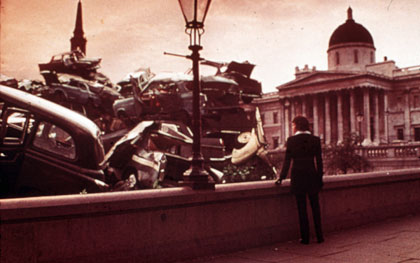
The Final Programme
A Byronic bisexual with black fingernails, a family fortune (including personal helicopter and futuristic armoury) and a Nobel Prize, Cornelius is played by Jon Finch half as world-saving sex messiah, half as truculently hapless klutz, self-deflatingly at the mercy of every unexpected plot turn. Plot, however, is not the movie’s strong point: humanity can only be saved if the world’s finest brains are decanted into one newborn child, offspring of Cornelius and his eternal sizzling nemesis Miss Brunner (Jenny Runacre). But look past the messy macguffin and countless confusing chase and fight scenes and there’s something compulsive about Cornelius’ louche and uneasy persona. Robert Fuest was a veteran of television’s The Avengers, and The Final Programme has a similar disorientating quality, of a world at once enigmatically arch and ropily throwaway.
With a later film from Fulton’s selection, Horace Ové’s Pressure (1975), we’re back at realism – a depiction of shabby mid-70s Notting Hill indoors and out. But it’s a realism of a subtly expanded kind. Its central figure Tony (Herbert Norville) is a bright, London-born black teenager caught between cultural identities. The various loyalties he is forced to choose between – young Briton with amiable white chums; dutiful son of hard-working, uncomplaining immigrant parents; black revolutionary; low-rent crim – are shown to create a tension of rival imagined hopes, some quietist, some radical, some blatantly more flawed than others. His inner life is a brief Ken Russell-esque dream: a frenzy of stylised violence.
Ové’s own sympathies can probably be worked out by contrasting Tony’s mother, a worn-down hysteric who works as a cleaner, with the local revolutionary celebrity, a sexually charismatic American black woman. But this is by no means the only contrasting juxtaposition Ové makes. At one point he cuts from a student agitator addressing assorted Notting Hill locals at a Black Power meeting to Tony at a disco with his white school chums. The speaker talks of the “contradiction” educated black teenagers find themselves caught in, but he’s not describing the contradiction Ové is showing us – of Tony’s secret yearning to lose himself safely among his affable white young peers; a dream, if anything, of the safety of loss of identity in a warm, vaguely defined pan-cultural, pop-cultural future. Ové approves radical politics, but he knows it’s a step into division and unease, into unresolvable and conflicted pluralism.
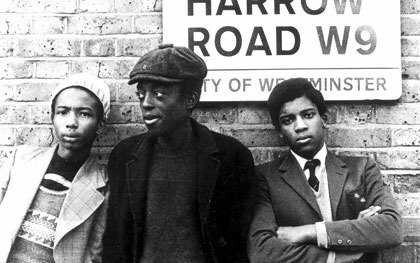
Pressure
With Margaret Thatcher’s victory in the 1979 General Election came the political shift Fulton sees as a causal endpoint for this brand of film – playful, puzzled, open, experimental, tentative. But I want quickly to explore another cause – or perhaps it’s a symptom. It’s hard when watching some of these films not to be reminded of the musical strand central to this same era of British culture: prog rock, in which similar utopias – and flaws – can be identified. Prog is a music that absolutely assumes social transformation, and was thick with related doubt and fears. And – famously – it came to be derided as vulgarly carnivalesque, all show-off stunts and bloated braggadoccio.
Like prog, the films that Fulton has rediscovered buzz with new kinds of content, things never before seen or heard. There's an angry formlessness that becomes exhausting – a reckless embrace of pop novelty used as a vector for high-speed social transformation. This explodes outwards in half-bodged cluster-fucks of horse trading, curdled idealism, cynical fantasy and anti-utopian satire.
Through all of these films runs the sly promise of code-shifting – the ability to slip between accents or roles or micro cultures – as a fluid theatre of identity. But we’re not all Peter Cook, and by the end of the 1970s far too much of British society was tottering around trying to regain a sense of itself – what it knew about sex, politics, media, the way people move through the streets and their lives. These films give telling glimpses of all these things. And perhaps, in 2010, they are returning to view at a direly apposite moment.
‘Sight & Sound’ sponsors ‘After the Wave: Lost and Forgotten British Cinema 1967-1979’, the retrospective strand at this year’s Edinburgh International Film Festival, which runs 16-27 June. For more details visit www.edfilmfest.org.uk. Click here for the chance to win a pair of tickets to the Opening Night Gala
That was then, this is now: Mark Duguid points to a new ‘golden generation’ of British TV writers (June 2010)
In search of poshlust times: Nick James on the new high-culture art films of Joseph Losey and Harold Pinter (June 2009)
O Lucky Man! reviewed on DVD by Tim Lucas (January 2008)
I'll Sleep When I'm Dead reviewed by Ryan Gilbey (May 2004)